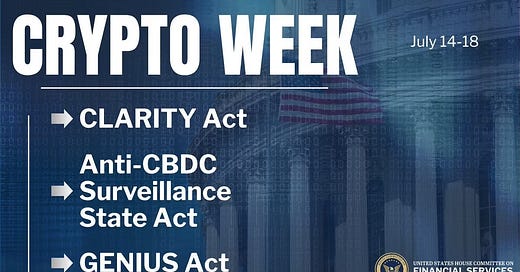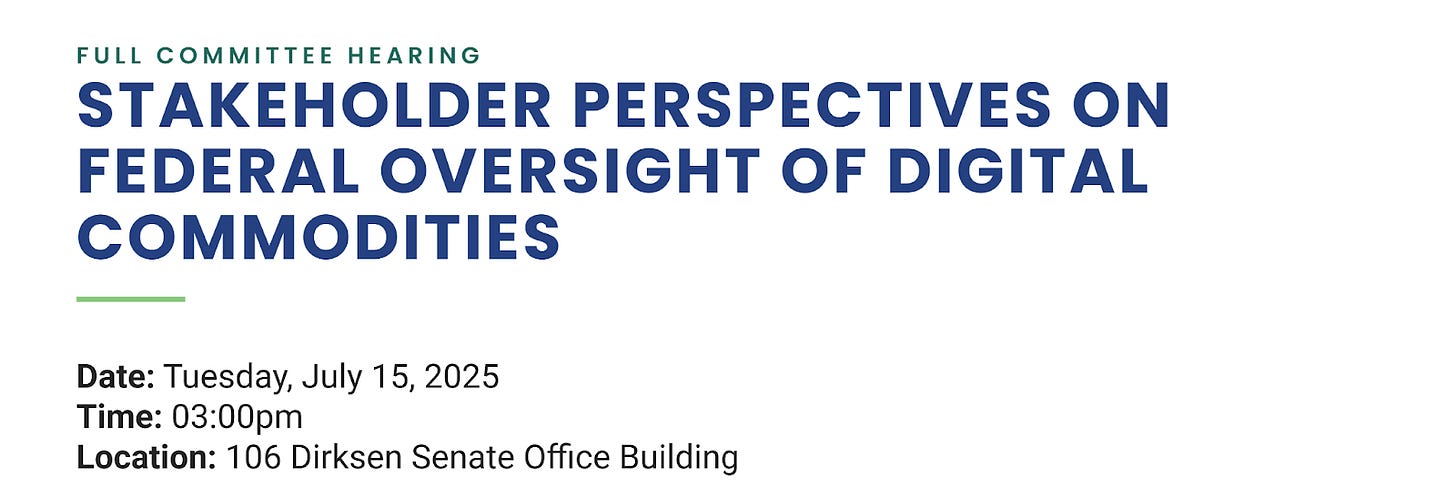The DeFi Debrief
Week of 7/14/25: Crypto Week is Here; New DEF Amicus Brief; Senate Crypto Hearing; Storm Trial Begins
House of Representatives Crypto Week
This week, the House of Representatives will commence “Crypto Week.” As a reminder, the House Financial Services Committee (HFSC), House Agriculture Committee (House Ag), and House Republican Leadership recently announced that they would use this time to focus on critical legislation for digital assets.
As part of Crypto Week, the House of Representatives will consider the Digital Asset Markets Clarity Act, the Anti-CBDC Surveillance State Act, and the Guiding and Establishing National Innovation in U.S. Stablecoins (GENIUS) Act as part of Congress’s efforts to make “America the crypto capital of the world.”
The Clarity Act, the House’s proposed regulatory framework to establish a digital asset market structure, was recently advanced to the House Rules Committee in a Rules Committee Print (RCP), representing a unified bill text between the HFSC and House Ag bill drafts. Now that the bill is at Rules Committee, it is set up for amendments, committee debate, and eventual inclusion in a House rule for debate on the floor. Notably, HFSC Chairman French Hill (R-AR) House Ag Chair GT Thompson (R-PA) filed a managers amendment to the Clarity Act, making line edits to the DeFi activities exempted under the Commodity Exchange Act in Section 409.
At 4 pm ET on Monday, July 14, there will be a House Rules Committee meeting to evaluate the three pieces of digital assets legislation and vote for progressing the legislation to full floor debate and then a final vote. If you are interested, you may watch the rules committee hearing at this link. Assuming the three bills are advanced to the House floor, they will each require a simple majority for final passage out of the House.
The GENIUS Act, the Senate’s proposed federal framework for the issuance and regulation of payment stablecoins, was recently passed out of the Senate with a bipartisan supermajority vote, and, if passed by the House, will head to President Trump’s desk for signature into law. The Clarity Act and Anti-CBDC Surveillance State Act will, if passed, head to the Senate floor.
Also on the House side, the House Ways and Means Oversight Subcommittee will host a committee hearing on Wednesday, July 16, entitled: “Oversight Subcommittee Hearing on Making America the Crypto Capital of the World: Ensuring Digital Asset Policy Built for the 21st Century.” Importantly, the House Ways and Means Committee retains jurisdiction over federal tax policy and played an instrumental role in Congress’s recent resounding bipartisan supermajority Congressional Review Act vote to protect DeFi protocols from IRS overreach.
In the Senate, on Tuesday, July 15, the Agriculture Committee will hold a hearing entitled: “Stakeholder Perspectives on Federal Oversight of Digital Commodities.” The hearing will feature discussion and debate on the Senate’s version of digital asset market structure legislation, following the recent release of the Senate Banking Committee’s digital asset market structure principles.
The witnesses will include Ji Kim, President and Acting CEO of Crypto Council for Innovation; former CFTC Chairs Rostin Behman and Timothy Massad; Walt Lukken, President and CEO of FIAconnect; and Tom Sexton, CEO of NFA News.
The Senate Banking Committee also reportedly plans to drop its market structure discussion draft this week.
DeFi Education Fund Files Amicus Brief in Lewellen Case Against the DOJ
On July 7, 2025, DeFi Education Fund and Paradigm filed an amicus brief in Lewellen v. Bondi, also signed by Bitcoin Policy Institute, Blockchain Association, Crypto Council for Innovation, Digital Chamber of Commerce, Solana Policy Institute, and the Uniswap Foundation. Lewellen is a federal lawsuit challenging the DOJ’s attempt to apply money transmission laws to open-source code and our amicus brief was filed in support of Lewellen’s opposition to the DOJ’s motion to dismiss.
In January 2025, Michael Lewellen filed a preenforcement complaint against the DOJ for capriciously prosecuting noncustodial software developers as money transmitters under 18 U.S.C. §1960, a federal statute which proscribes failing to register as a “money transmitting business.” Our brief argues (1) that software developers do not “transmit” money on behalf of the public; (2) the government is wrongly prosecuting developers under a novel and incorrect interpretation of §1960; and (3) the government’s improper interpretation of §1960 is chilling innovation in the crypto industry.
As the brief explains, the DOJ’s sweeping reading of §1960 casts a cloud of uncertainty over software developers in the digital assets industry, stifling development that is critical to the industry’s growth.
To read our X thread on the amicus brief, click here. To read the brief itself, click here.
Senate Committee Hearing: “Code Is Not a Security”
On July 9, 2025, the Senate Committee on Banking, Housing, and Urban Affairs held a hearing entitled: “From Wall Street to Web3: Building Tomorrow’s Digital Asset Markets.” Witnesses included Paradigm Head of Research Dan Robinson; Blockchain Association CEO and former CFTC Commissioner Summer Mersinger; Chainalysis co-founder Jonathan Levin; former CFTC Chair Timothy Massad; and University of Minnesota law professor and former chief White House ethics lawyer Richard Painter.
While panelists presented a range of views, they mostly agreed that regulatory uncertainty has stifled innovation and driven crypto talent and capital overseas.
Of note, Paradigm’s Dan Robinson gave a compelling argument in support of DeFi, focusing much of his testimony on the benefits of DeFi technology. In his written testimony, Robinson stated “[I]n the spirit of supporting DeFi’s growth, and because true DeFi is noncustodial software, any decentralized crypto asset exchange should not be required to register with the CFTC, SEC, or any other regulator. At base, a true DeFi protocol is software. Trades occur through it but it does not hold assets or off-ramp crypto assets into fiat currency. Just as we do not ask Microsoft to register Excel with the SEC just because companies use it to track their IPOs, we should not demand the engineers of DeFi protocols register their software just because others use it to trade.”
For more on DEF’s favorite moments from the hearing, view our readout here.
Roman Storm’s Trial Begins in Manhattan
With Roman Storm’s trial starting this week in the Southern District of New York, DEF put together a helpful backgrounder to get everyone up to speed. "Today, the target is Tornado Cash... tomorrow it could be the developers of a VPN, an encrypted messaging app, or a peer-to-peer file sharing tool."
Also be sure to check out this great interview from Crypto in America linked here.
DeFi Dictionary Phrase of the Week
DEF's word of the week: Open-Source Code
Our phrase of the week is the backbone of public blockchain networks and an essential component of global participation in crypto. For more DeFi definitions, please follow our new X page, DeFi Dictionary.
Notable and Quotable










